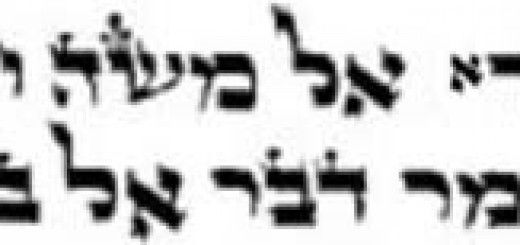By Avner Friedmann
The Torah states[1]: “Never again has there arisen in Israel a prophet like Moshe”. Commenting on this our sages stated[2], “Not in Israel, but in the nations there has arisen such a one.” His name is Bilaam. He was as wise as Moshe[3], had the potential of Moshe, and yet chose the path of evil and of harming Israel. The Zohar writes[4] that while Moshe was the greatest person on the side of holiness, Bilaam sank to the lowest levels of impurity, which is called the ‘Other Side’. Bilaam was “One who hears God’s utterances and knows the thoughts of the Most Exalted”[5], yet he let his ego and base desires get the best of him.
The Ethics of Fathers tell us[6] that, “Whoever possesses the following three characteristics is of the disciples of our father Avraham; and the three opposite characteristics, is of the disciples of the wicked Bilaam. The disciples of our father Avraham possess a good eye, a humble spirit, and a meek soul. The disciples of the wicked Bilaam possess an evil eye, an arrogant spirit, and a greedy soul.” We learn of Bilaam’s wickedness from the following verses:
An Evil Eye: The Parsha states[7]: “Bilaam raised his eyes and saw Israel dwelling according to its tribes…” Rashi interpreted it to means that he tried to induce the evil eye upon them.
An Arrogant Spirit: The Torah tells us that Balak, the king of Moav, sent dignitaries to Bilaam to convince him to join them, so that he could help Balak against the perceived threat from Israel. Rashi says[8] that in his arrogance Bilaam refused to admit that Hashem had categorically forbidden him to go with them to curse Israel, so he gave them the impression that they were simply not important enough dignitaries for him to deal with. The verse tells us[9]: “Bilaam arose in the morning and said to the dignitaries of Balak, “Go to your land, for HaShem refuses to let me go with you.” By saying “with you”, Bilaam implied that it was only with this delegation that he could not go with, but if Balak were to send a delegation of more important dignitaries, the answer may be different. The Zohar states[10] that in his excessive lust for honor, Bilaam would praise himself and deceive people to think that he was a holy prophet, whereas, in reality he had sunken to the lowest levels of impurity and depravity.
Greediness: The Parsha states[11]: “Bilaam answered and said to Balak’s dignitaries: ‘Even if Balak gives me his houseful of silver and gold, I cannot transgress the words of HaShem my G-d…” Rashi learns from it that given the opportunity, in his greed, he would have violated the word of HaShem for a house full of gold and silver. Our Rabbis ask, “Why mention both silver and gold?” The Zohar answers that in the Holy Tongue gold is ‘Zahav’-זהב, which consists of two words, Za- hav, which means ‘this I want’, referring to his lust for honor. Silver in the Holy Tongue is ‘Kesef’-כסף, money, which comes from the root “to yearn and desire.” If there was one thing that Bilaam loved and desired more than honor, it was money! His greed consumed him to the point that he actually thought he could outsmart G-d.
After all the excessive pursuit of physical pleasures and his evil traits, Bilaam had the audacity to say[12]: “May my soul die the death of the upright, and may my end be like his!” Bilaam prayed that his death be like that of the righteous of Israel and that when his life would end, he should inherit, the good rewards of Gan Eden, rather than purgatory[13].
But, one cannot live life chasing the basest desires, without toiling to better his traits, and expect to die as a holy man, to reap the rewards of the World to Come. One must commit to living a life of spirituality and elevate himself with the help of Torah and mitzvot. He must keep in mind the teaching of our holy sages[14]:”Commensurate to the effort is the reward.”
The Ethics of our Fathers concludes the Mishna by stating: “What is the difference between the disciples of Avraham our father and the disciples of the wicked Bilaam? The disciples of Avraham eat (enjoy the fruits of their good qualities) in this world, and inherit the World to Come. But the disciples of Bilaam inherit purgatory and descend into the pit.” We see from here that those who follow the will of HaShem, not only inherit the World to Come, but this world as well, whereas the disciples of Bilaam are doomed in both this world and the world to come!
[1] Vezot Habracha 34:10.
[2] Midrash Rabah Bamidbar parasha 14 piska 19.
[3] Tana Debei Eliyahu Zutah perek 10.
[4] Balak 193b, Zohar Chadash, Achrei Mot 58b..
[5] 34:16.
[6] 5:19.
[7] 24:2.
[8] Based on Tanchuma.
[9] 22:13.
[10] Zohar Balak 193b.
[11] 22:18.
[12] 23:10.
[13] Ramban 23:10.
[14] Avot 5:21.






















